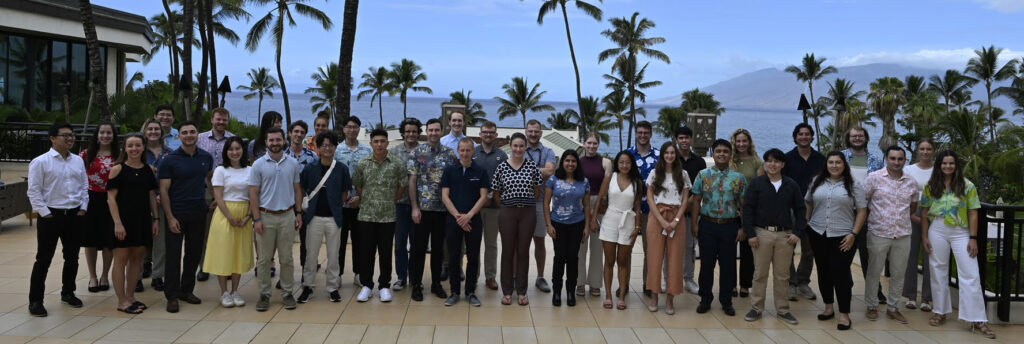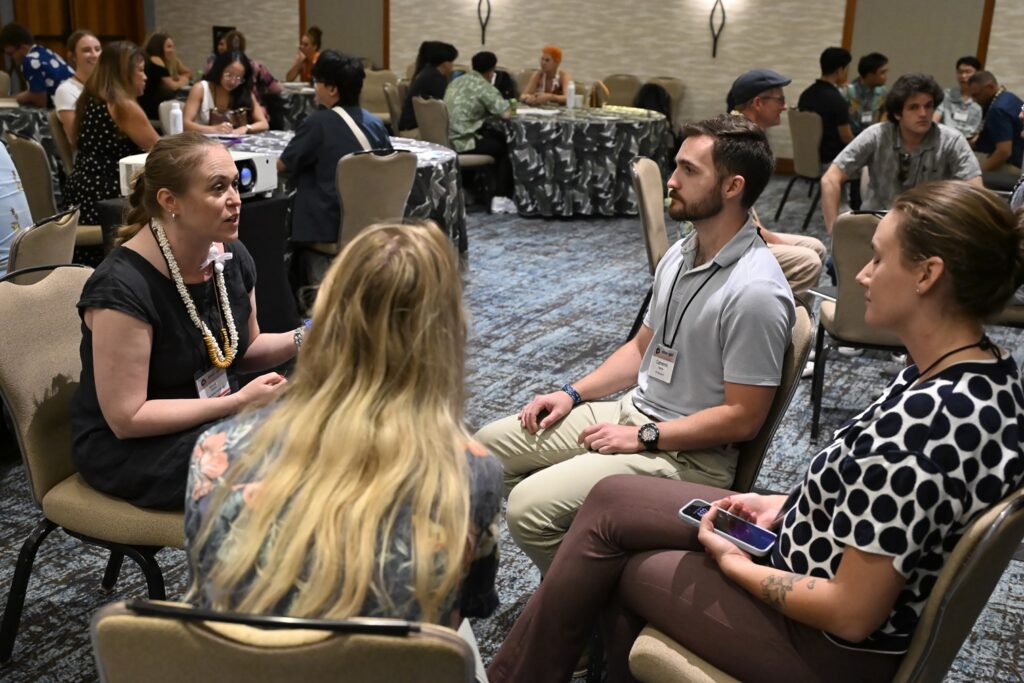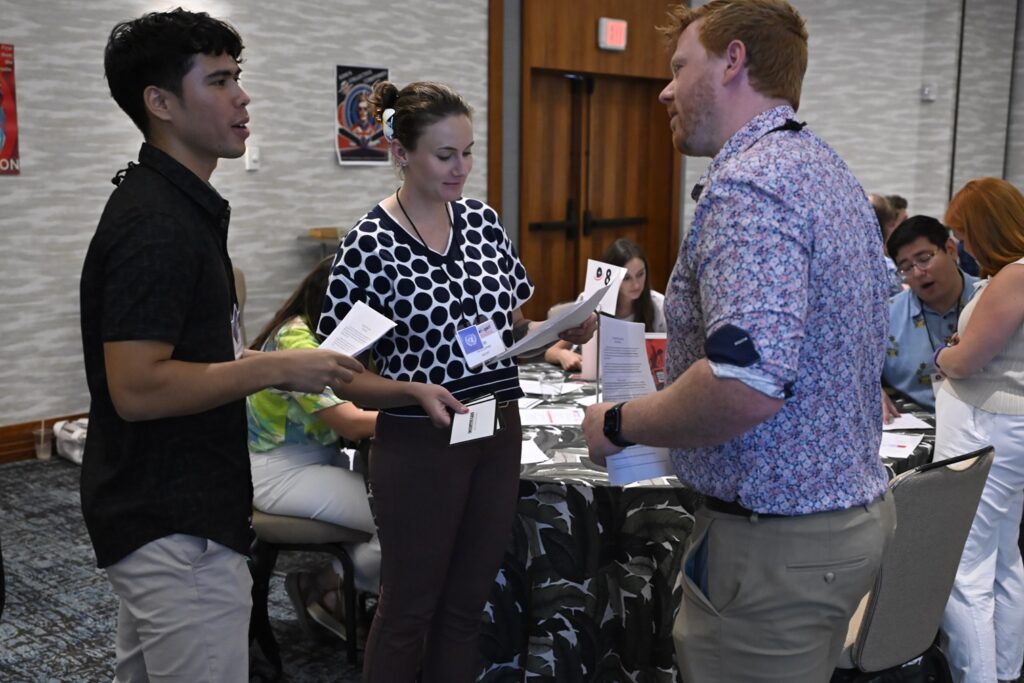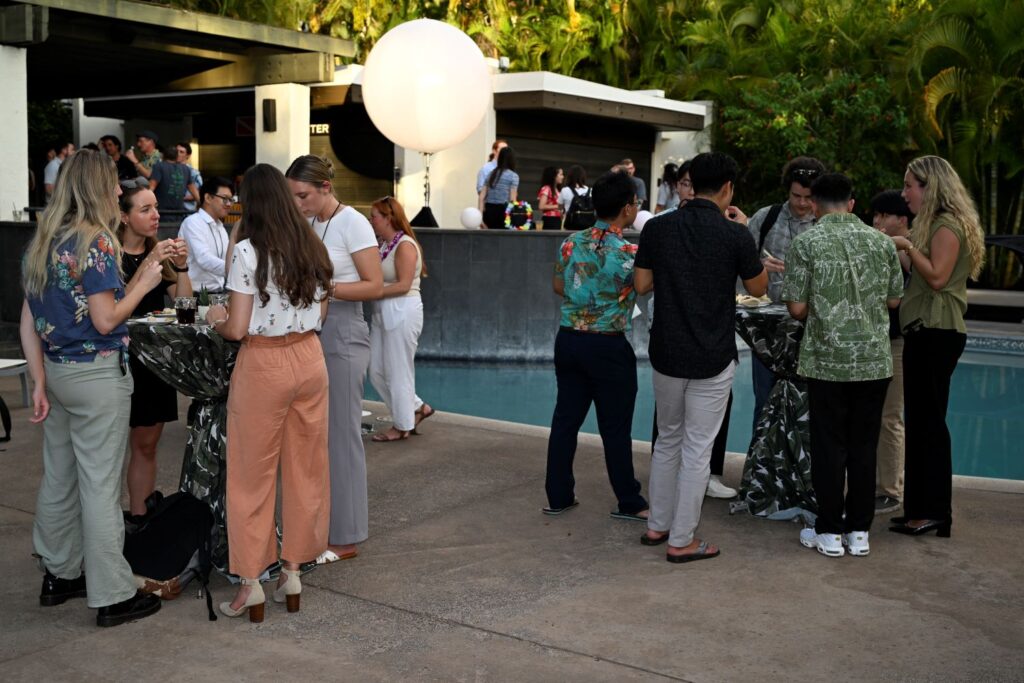The 7th annual EMER-GEN® Program challenged, informed and mentored thirty-eight young professionals through a 3-week schedule. A joint initiative of the AMOS Conference and the Space Generation Advisory Council (SGAC), the program presented by the Maui Economic Development Board (MEDB) kicked off with three webinars and culminated in the in-person event September 15-17 at the Wailea Beach Resort, Maui.

Designed for young professionals and students enthusiastic about careers in space, the cohort included fourteen Hawaii-based participants. Sessions included guest speakers; a career pathway panel; speed mentoring; consensus building and an innovation challenge. Participants engaged in lively discussions, brainstorming sessions, and networking opportunities that fostered collaboration, the exchange of innovative ideas and developed leadership skills.
“Each year the program is shaped by the intended audience—young professionals” said Annette Lynch, Director of Communications with MEDB and manager of the EMER-GEN Program. “The content of the challenges, guest presentations and table-top exercises are updated to stay relevant in an ever-changing industry.”
Three young professionals join MEDB on the planning committee with two representatives nominated by SGAC—Christopher Capon, Nominal Systems; and Ulrike Nostitz, a space law enthusiast who had just completed the ISU Space Studies Program 2024 in Space City, Houston. They were joined by EMER-GEN Alumnus and Maui resident, Matthew Lugo of Privateer Space.
Matthew Lugo said of the EMER-GEN experience, “I really hope that the attendees this year got a sense of community within the space industry, that they got a chance to network and understand that some of the ideas that they have, even now, are going to have implications in the future. The network they’re starting to build now will enable them in the future when they move into management or become decision makers and that they’ll be empowered to make the change that they want to see in the future.”
Hawaiian Sense of Place
The EMER-GEN Program includes a focus on Hawaiian culture and this year’s guest speaker, was Michael Nāhoʻopiʻi, Executive Director of Kahoʻolawe Island Reserve Commission (KIRC.) The island of Kahoʻolawe is just seven miles off the coast of Maui. It is managed by the KIRC team, who are working towards a restoration of the island.
Nāhoʻopiʻi shared, “The abundance of historical and archeological sites at Kahoʻolawe paints a picture of the island as a navigational center for voyaging and a center for agriculture. Modern times have been less kind. The island has been home to a penal colony, a sheep and cattle ranch, and a U.S. Navy bombing range. Those land uses were detrimental to the island’s delicate ecosystem and led to severe habitat degradation. The KIRC team has taken on the challenge to restore these habitats with on-the-ground hard work coordinated by expert assistance. In addition to physically restoring the island of Kahoʻolawe, we are undertaking the cultural restoration of the island.”
Matthew Lugo helped to coordinate this segment and explained, “I feel it’s important for those in the space industry to be stewards of the Earth environment as well. Space technologies should benefit the sustainability of the planet. Mitigation now is more powerful than remediation in the future.”
Mentoring
Mentoring is a popular feature of EMER-GEN for both the mentors and the delegates. This year again the mentoring session was kicked off with a career panel to provide answers to the most frequent questions. Major Sean Allen, U.S. Space Force; Liz Pearce, KBR; Daron Nishimoto, MEDB and EO Solutions; Valerie Skarupa, DarkStar Space, LLC, gave perspective on each of their careers; guided by emcee Michael Barton of a.i. solutions. The panel discussed their own career paths, turning points and provided tips for navigating careers and networking opportunities.
Joining the four career panelists to mentor the cohort in small groups of three were Krystal Azelton, Secure World Foundation; Steph Earle, U.S. Department of Transportation; Mike Gabor, Millennium Space Systems; Jacqui Hoover, Hawaii Island Economic Development Board; Diane Howard, National Space Council, The White House; Paul Jeffers, Daniel K. Inouye Solar Telescope; Doug Loverro, Loverro Consulting, LLC; and Mark Mulholland, MITRE.
“The mentoring session was incredible!” said Albany Coates, a student at University of Hawaii at Manoa. “It was amazing to speak directly with leaders in their fields about their own experiences and to listen to the advice they had.”
Policy Game
In the policy game, facilitated by Becky Cudzilo of Astroscale, delegates were split up to represent seven fictitious countries, with influencers in each country, and fictitious companies that would also have say on an international space treaty. In a webinar prior to the main program, Weikert, a Business Development Manager for National Security programs at Astroscale U.S.’s Washington DC office, provided valuable background on the game and space policy. Weikert informed the cohort on the global actors currently involved in SSA and their capabilities, as well as an overview on global space policy and the law ecosystem.
Pointing out that the last UN treaty was in 1984 (The Moon Treaty) Kristin Shahady contributed, “Treaties can be difficult to create and ratify in the different nation states. That’s why this game is so important to understand why that may be the case—why different relationships, different feelings and interests in respective nations can result in a more difficult time to sign a treaty.”
“It was not only an exciting and fun session but also a fantastic learning experience for all participants involved,” said Nostitz who helped to coordinate the segment in her role with the program committee. “It gave us a great real-life experience of how to negotiate, how to talk to one another, how to bring your point across, find friends and allies and even manipulate a few people.”
Innovation Challenge
On Day 2 delegates were challenged to work in teams to pitch a solution to create new opportunities for space-based technologies. The goal was to improve skills of collaboration and communication and understanding of the process of innovation through solving a grand-challenge problem. The specific challenge posed to the cohort was—How can we utilize the 2029 close encounter with Apophis to drive long-term, enduring benefits for humanity?
“In 2029, the asteroid Apophis will pass closer to Earth than any other known asteroid of its size in recorded history,” said Tom Kubancik of Trusted Space who helped to shape the challenge. “This event presents both a challenge and an unprecedented opportunity. While the close approach of Apophis highlights the potential risks posed by near-Earth objects (NEOs), it also offers a unique chance to leverage this encounter for the enduring benefit of humanity.”
The Innovation Challenge culminated with 7-minute pitch presentations by the seven teams to showcase their innovative solutions.
A judge for the challenge, Travis Blake commented, “They had a really hard challenge. When I heard that they only had three hours to put this together, that was absolutely amazing! We, the judges, were stunned when we heard the amount of depth that was brought into the solutions and the coherence, the communication ability of the teams, the fact that it just wasn’t one person presenting, but they had rehearsed everything was just amazing. We thought that they had at least two to three days to work on it, not three hours. So that really says a lot.”
“My favorite part of the program was the innovation challenges because not only was it a great team exercise, but it was also a great activity that gave me perspective into the importance of policies,” said Howin Ma, a student at University of Hawaii at Manoa. “As a mechanical engineer student, I am often more focused on the technical and design aspects to ensure mission success, and very few emphases are placed on the potential consequences to the contribution in space debris. Learning about policy helps to become more aware of the problem and develop a mindset for finding solutions rather than contributing to the problem.”
Closing Comments
The EMER-GEN experience offers unique opportunities for the cohort to network with their peers, with mentors and the AMOS community through the interactive exercises; breakfasts and lunches; and social receptions.
“The most valuable thing for me is meeting a lot of very interesting people, doing a lot of very interesting things,” said Fabio Chiappina of a.i. solutions who went on to participate in the AMOS Conference. “Just getting to chat with a lot of my fellow EMER-GEN folks, hearing about their work, several of them had posters and papers as well, and chatting with them gave me a lot of great ideas. And my notebook is literally full of a lot of really interesting directions to take my own research, and I’m very, very excited about that.”
EMER-GEN is presented by the Maui Economic Development Board, Inc. (MEDB), a nonprofit corporation established in 1982 to focus on diversifying Maui’s economy. MEDB’s mission involves taking innovative actions that strengthen existing industry as well as diversifying through new opportunities.

Speed Mentoring at EMER-GEN 2024

Delegates negotiate during the Policy Game at EMER-GEN 2024

Relaxing and networking at EMER-GEN
